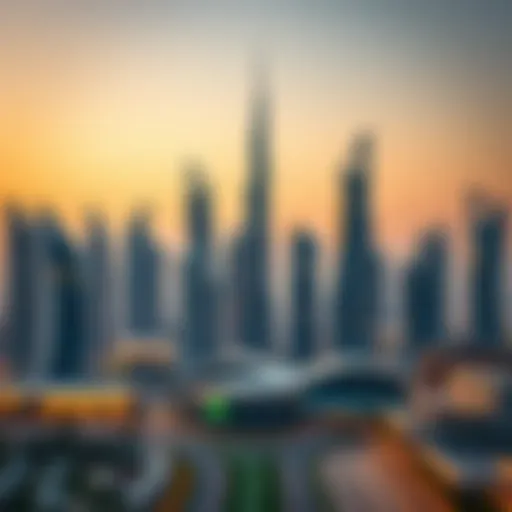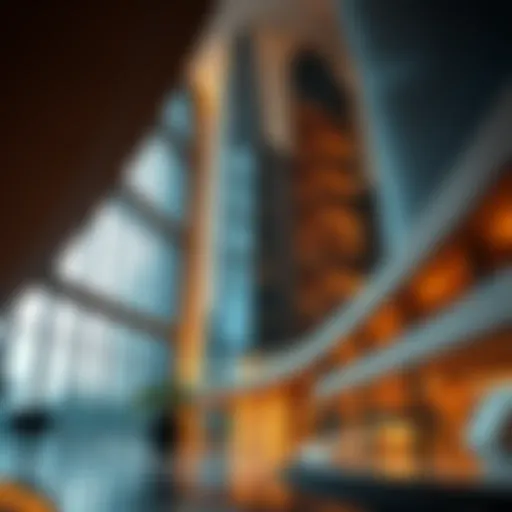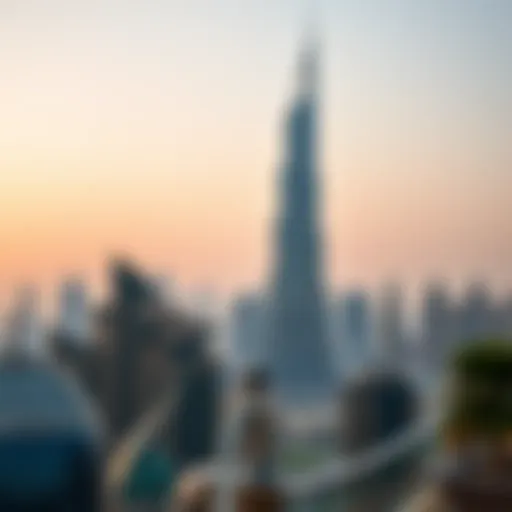Ramadan 2023 UAE: Cultural and Economic Insights


Intro
As the crescent moon ushers in Ramadan 2023, the United Arab Emirates prepares for a month steeped in tradition and spirituality. For millions, this period signifies more than just fasting; it influences the very fabric of society. From early morning meals to communal prayers, the impact resonates through everyday life, affecting everything from family dynamics to the economy.
During Ramadan, the UAE transforms into a vibrant tapestry of cultural practices and community engagement. This month acts as a catalyst, reshaping daily routines significantly. Bursting with social gatherings, iftars become focal points of connection, fostering relationships across diverse communities. Retailers often capitalize on this spirit of giving, creating special promotions designed to draw in both locals and tourists alike.
In the realm of real estate, Ramadan's effects ripple through the market landscapes. Investors, buyers, and managers carefully monitor how communal sentiments influence housing demand, particularly in family-oriented neighborhoods. This article endeavors to unravel the intricate relationship between Ramadan 2023's traditions and the contemporary trends that define life in the UAE. We will explore current market trends, provide insights into buying and renting during this period, and reflect on the repercussions this holy month brings.
Ultimately, our exploration serves stakeholders across various sectors—be it investors looking for sound opportunities, buyers seeking homes, or agents navigating client expectations. Let’s delve into how this season not only shapes individual lives but rewrites the rules of engagement in the UAE’s rapidly evolving landscape.
Overview of Ramadan in the UAE
The significance of Ramadan extends beyond religious observance; it occupies a central role in the cultural and social fabric of the UAE. As this holy month approaches, the atmosphere transforms, echoing the collective anticipation and reverence held by the Muslim community. Understanding Ramadan in the UAE is essential, especially for investors and analysts aiming to navigate the economic shifts that accompany this period.
This section seeks to illuminate the diverse elements of Ramadan, including its cultural implications and attentiveness to local practices. Insights into how daily life shifts during this month can offer a distinct viewpoint for various sectors, particularly retail and hospitality. Notably, Ramadan not only instills a sense of community but also prompts individuals to engage in charitable acts, thus fostering an environment of generosity.
"In Ramadan, even the smallest act of kindness carries great weight and can ripple through the community, sparking a legacy of goodwill."
The month serves as a reminder of resilience, empathy, and reflection, making it crucial for both locals and expatriates to embrace the values and practices associated with this time. The interplay between tradition and modernity during Ramadan also presents unique opportunities for brands and businesses aiming to resonate with both residents and visitors.
In addition to spiritual observance, it presents opportunities to explore the undercurrents of economic activity, community engagement, and the evolution of cultural practices. By examining how Ramadan redefines daily routines and interactions, a clearer picture emerges that elucidates its importance in the broader context of the UAE's identity and economic landscape.
Understanding these dynamics is particularly relevant for individuals looking to engage meaningfully with the market during this period. As we delve into the cultural significance and historical context of Ramadan, the insights gained will contribute to a comprehensive understanding of the month’s far-reaching implications.
Ramadan Dates and Observances
Understanding the dates and observances for Ramadan 2023 is crucial, as this month shapes not just spiritual routines but also the social and economic fabrics of life in the UAE.
Timing is everything. The start and end dates of Ramadan can fluctuate, largely depending on lunar sightings. This year, Ramadan is expected to begin on the evening of March 22, 2023, and conclude with Eid al-Fitr celebration on April 21, 2023. The practice of observing these dates is fundamental for Muslims across the globe, and for residents of the UAE, they mark a season of reflection and growth.
Observances during this month aren’t just religious; they intertwine with daily life, impacting local customs, business operations, and community interactions. The spiritual atmosphere is palpable, and it encourages generosity and social cohesion.
Expected Start and End Dates
- Start: March 22, 2023
- End: April 21, 2023
The date can vary slightly based on moon sightings, which imbues the month with a sense of anticipation and community engagement. In the UAE, preparations generally kick off a few days ahead, as families curate their plans and businesses prepare for the influx of demand, particularly for Iftar meals.
Key Religious Practices
Practices during Ramadan serve as the backbone of the observance, guiding not just the spiritual focus but everyday activities too.
Fasting
Fasting, which runs from dawn until sunset, stretches beyond abstaining from food and drink. It represents self-discipline and enhances one's empathy for the less fortunate. This annual practice fosters a collective spirit and encourages gratitude. One of the overarching benefits of fasting, especially in the UAE's climate, is its ability to create a shared experience among a diverse population. Ramadan fosters unity, as people from various backgrounds join in this spiritual journey.
Prayer
Secondly, prayer takes center stage during this sacred month, with communal prayers, particularly the Taraweeh prayers, gaining increased participation. Praying in congregation serves not only as an avenue for spiritual solace but enhances social ties within the community. The unique feature of nightly prayers during Ramadan creates an inviting atmosphere, drawing in both local and expatriate communities. Enhanced dedication to prayers during Ramadan uplifts spirits and connects individuals.
Charity
Lastly, charity, or Zakat, is another pivotal aspect of Ramadan. The act of giving is emphasized greatly, furthering a sense of compassion in society. People are encouraged to donate to charities and help those in need, fostering a community that thrives on support and generosity. The engagement in charitable activities during this month often boosts local NGOs and welfare initiatives significantly, aligning with the broader goal of societal well-being.
"Giving back during Ramadan is not merely a duty, it's a way to strengthen community bonds and showcase our shared humanity."
This sentiment rings true in the UAE, where charitable initiatives see a surge in participation and funding during Ramadan, helping bridge the gap for the less fortunate.
Engaging in these practices enriches the Ramadan experience, weaving a tighter fabric of community, spirituality, and cultural identity within the UAE. For investors and businesses, recognizing these dynamics provides substantial insight, paving the way for aligning services and products to meet the evolving needs of the populace during this unique month.
Economic Impact of Ramadan
The significance of Ramadan in the UAE reaches far beyond its spiritual dimensions; it profoundly influences the economic landscape as businesses and consumers adjust to the practices and traditions of this holy month. From retail fluctuations to shifts in real estate dynamics, understanding these impacts not only highlights the overall health of the economy but also allows stakeholders to prepare strategically for the shifts that occur during this time. The economic ramifications of Ramadan create both challenges and opportunities, making it a topic worthy of careful examination.
Trends in Retail and Consumer Behavior
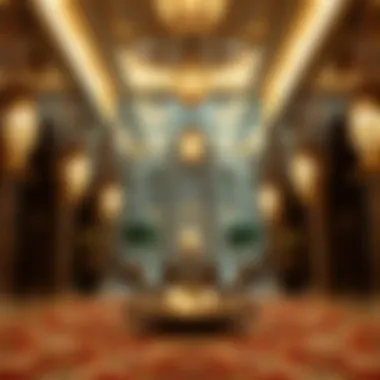

Retail trends during Ramadan showcase a fascinating mix of tradition and modern consumer habits. During this month, there's typically a spike in spending, primarily around food and gifting. The food retail sector sees a notable uptick, as families prepare for Iftar by shopping for traditional and modern culinary items, ranging from dates to deli meats. This increased purchasing behavior draws attention not only to food retailers but also to restaurants and catering businesses, which offer special Iftar menus to meet demand.
Among the most striking trends is the preference for convenience, as consumers lean towards online shopping platforms for both groceries and gifts. Platforms like Carrefour and LuLu have ramped up their delivery services, catering to a demographic that values efficiency amidst busier schedules during the holy month. Consumers are increasingly looking to get their essentials ordered online, eliminating the hassle of crowded stores. In addition, Ramadan promotions and discounts are prevalent, enticing buyers and driving more foot traffic toward physical stores, creating a continuous cycle of consumer engagement and sales.
Real Estate Sector Dynamics
Real estate in the UAE also shifts during Ramadan, reflecting changes in both consumer behavior and economic trends. The sector witnesses fluctuating dynamics that can be attributed to various factors, including the seasonality of supply and demand, changing lifestyles, and macroeconomic conditions.
Market Adjustments
Market adjustments during Ramadan are significant. For many investors and developers, this month is characterized by a reevaluation of property offerings to align with consumer needs. Developers usually put projects on pause or slow down construction, anticipating a seasonal dip in buyer enthusiasm. Furthermore, cultural considerations play a crucial role; properties that offer spacious communal areas for family gatherings gain popularity, appealing to those looking for more family-oriented living spaces. This desire indicates a natural shift towards creating environments conducive to community celebrations.
Additionally, properties located near mosques tend to gain value during this period as they provide convenient access for worshippers. Consequently, it’s essential for real estate agents and investors to keep a keen eye on these dynamics and adjust their strategies accordingly. This adjustment often involves marketing properties in accordance with the month’s cultural and spiritual significance.
Leasing Trends
The leasing trends during Ramadan also reflect a nuanced understanding of consumer priorities. Traditionally, demand for both residential and commercial spaces experiences a shift. Rental agreements may show more short-term leases, especially in areas known for their community activities and festivities during Ramadan. Landlords are increasingly open to negotiations, making it a lucrative time for those looking for temporary accommodation.
Moreover, businesses often seek larger or more centrally located spaces to accommodate surge customers during Iftar hours, leading to temporary adjustments in leasing agreements. As the market responds to these changing demands, landlords and tenants must engage in proactive discussions to ensure mutual benefit—this adaptable nature fuels the overall resilience of the market.
In short, the economic impact of Ramadan manifests through distinctly observable patterns in consumer behavior and real estate dynamics. Stakeholders who grasp these trends will often find themselves one step ahead, poised to leverage the unique opportunities this season offers.
Social Changes During Ramadan
The month of Ramadan is not just a time for spiritual reflection; it also brings about significant changes in social dynamics. These shifts, influenced by fasting, prayer, and increased communal activities, foster stronger ties within families and communities. The social fabric of the UAE transforms during this holy month, as individuals and families adapt their routines and engage more deeply with the values of community and charity.
Alterations in Daily Routines
Daily life is noticeably altered during Ramadan. Mornings begin at the crack of dawn; many embrace the pre-dawn meal known as Suhoor, laying the groundwork for the day ahead. Offices and schools adjust schedules, often starting later to accommodate those who fast. The typical bustling atmosphere of the UAE shifts to a more subdued pace during daylight hours, as people conserve energy and focus on spiritual growth.
Fasting introduces a rhythm where productivity is often measured by a different yardstick. The night becomes vibrant with activity as many break their fast with elaborate meals and gatherings. This shift in daily routine encourages a greater emphasis on family time and socializing, reinforcing bonds that might otherwise fray in the hustle and bustle of modern life.
Community Engagement and Events
The essence of community spirit shines particularly bright during Ramadan. Neighborhoods come alive with events and initiatives aimed at fostering togetherness and shared experiences.
Iftar Gatherings
Iftar gatherings are a defining feature of Ramadan in the UAE. These communal meals, which break the daily fast, invite friends, families, and even strangers to share food and fellowship. Hospitality is at the heart of these gatherings, as hosts often prepare traditional dishes that symbolize both cultural heritage and generosity. The key characteristic that sets Iftar apart is its collective nature; it's not merely about breaking bread but creating a sense of belonging and unity.
The uniqueness of Iftar gatherings lies in their inclusivity. Many are open to all, regardless of background or faith, making it a rich opportunity for intercultural dialogue. However, the sheer abundance of these events can sometimes place financial pressure on hosts, requiring careful planning and budgeting.
Charitable Initiatives
Charitable initiatives during Ramadan also reflect the spirit of giving and support. Many organizations launch campaigns to feed the hungry, support the less fortunate, and assist those in need. A remarkable aspect of these initiatives is their collective outreach; entire communities often band together to contribute, showcasing the UAE's ethos of generosity and care.
These initiatives gain traction as they resonate with the core principles of Ramadan, emphasizing empathy and support for one another. Encouraging participation from all societal sectors, they help address social inequalities. However, while many engage fervently, there's a need for awareness regarding transparency and impact, ensuring that efforts truly reach those in need.
"Ramadan embodies unity, not just in faith, but also in our shared responsibility toward society."
In sum, social changes during Ramadan are profound, shaping community interactions and creating a sense of collective purpose. By examining daily routines and community engagements, one can appreciate the rich tapestry of social life in the UAE during this month.
Culinary Trends During Ramadan
During the holy month of Ramadan, the culinary landscape undergoes a remarkable transformation, playing a pivotal role in both family life and community engagement in the UAE. The dishes prepared and shared during this period hold not just nutritional value but also cultural significance, reflecting traditions as well as modern trends.
Traditional Dishes
Traditional dishes take center stage during Ramadan, with families often gathering to break their fast together. Foods such as harissa (a slow-cooked wheat and meat dish), samosas, and dates are staples. These meals are more than just sustenance; they are steeped in meaning and history. For instance, dates are often the first food consumed at iftar, symbolizing both nourishment and the practice of emulating the Prophet Muhammad.
Moreover, the preparation of these traditional meals is often a family affair, fostering bonds among generations. Recipes passed down from mothers to daughters create a sense of continuity and identity, enhancing the communal spirit of Ramadan. In essence, these classic dishes do not merely satisfy hunger; they bind families together.
Innovations in Iftar Offerings
While traditional dishes resonate deeply, there’s an exciting wave of innovation in iftar offerings across the UAE that propels the culinary scene into the contemporary realm. Restaurants and catering services are reinventing dining experiences to create memorable moments. This adaptation honors the traditions while embracing modern tastes and preferences.
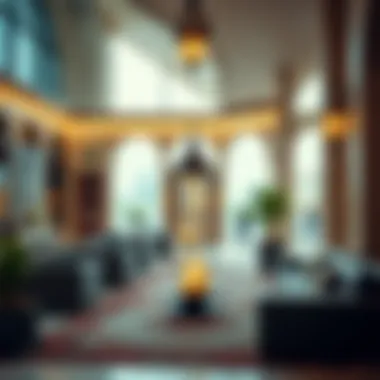

New Dining Experiences
Contemporary dining experiences have surged in popularity during Ramadan. Many eateries are now offering iftar buffets that combine traditional favorites with modern cuisine. This blend showcases global influences while still paying homage to local customs. These restaurants often decorate their spaces with Ramadan themes, providing patrons with an ambiance that enhances their dining experience.
What's more, the interactive nature of these buffet-style meals encourages socialization, making them a sought-after choice for groups wanting to break their fast together. The blend of flavors and the presentation of dishes serve not only as nourishment but also as a feast for the eyes, making dining out a pleasurable experience that enriches the spirit of Ramadan.
Home Delivery Services
With the rapid advancement in technology, home delivery services have become a crucial aspect of Ramadan dining. High demand for convenience has led many restaurants to adapt by providing delivery options that cater to families wanting to enjoy their iftar at home without the hassle of cooking. Services like Zomato or Deliveroo have seen notable increases in orders during this month, showing the growing trend toward home dining.
The appeal of these delivery services lies in their ability to offer a variety of dishes from different cuisines, allowing families to explore new flavors while staying true to Ramadan traditions. Additionally, many restaurants curate special Ramadan packages that include various dishes at competitive prices, making them an attractive option for families.
However, there are considerations. While home delivery is convenient, it can sometimes lack the warm, communal atmosphere of gathering around the table with loved ones. Some families may miss out on the social aspect that comes with enjoying meals together. Still, the flexibility that home delivery provides has made it an integral part of the Ramadan culinary landscape.
"Food is the thread that binds families and communities together during Ramadan, weaving a fabric of tradition, taste, and togetherness."
For more insights on Ramadan-related culinary practices, consider visiting en.wikipedia.org or britannica.com.
Health Considerations During Ramadan
Ramadan presents unique health challenges and opportunities that require careful consideration. Observing fasting during this holy month impacts not only spiritual life but physical well-being as well. It’s essential to approach health in Ramadan with a mindset that blends traditional practices with modern understanding.
Nutritional Guidance for Fasting
Fasting from dawn until sunset is a cornerstone of Ramadan. However, the way meals are consumed during this time can greatly affect overall health. Here are some key nutritional pointers:
- Hydration is Key: After a whole day without water, most tend to drink excessively during iftar. It’s better to space out hydration through the night and early morning to avoid discomfort and ensure the body receives adequate fluid.
- Balanced Suhoor (Pre-Dawn Meal): A well-planned suhoor can set the tone for the day. Opt for complex carbohydrates like oats or whole grains, adding proteins like eggs or yogurt to keep energy levels steady. Fresh fruits can also add a necessary boost.
- Avoid Sugary Iftar: While it might be tempting to break fast with sweet treats, it's vital to avoid consuming too many sugars at once. This spike in sugar can lead to energy crashes later.
Proper food choices during Ramadan can enhance stamina and focus, making the fasting experience both spiritual and physically sustainable.
It’s important for individuals to listen to their bodies and adjust their eating habits accordingly, especially those who are not used to fasting.
Managing Health Conditions
People with specific health conditions should take extra precautions during Ramadan fasting. Conditions like diabetes, hypertension, and gastrointestinal issues can be particularly sensitive to fasting patterns. Here are tailored considerations for managing health:
- Consult Healthcare Professionals: Before Ramadan begins, individuals should meet with healthcare providers to understand how fasting may impact their condition. This can help reflect on if adjustments are necessary.
- Monitor Blood Sugar: For diabetics, monitoring blood glucose levels consistently before iftar and Suhoor is crucial. Implementing a meal plan that considers carbohydrate intake helps avoid steep fluctuations.
- Medication Adjustments: Some medications may require adjusting timing or dosage. For instance, medications typically taken with meals may need to be taken at suhoor or iftar.
In essence, health management during Ramadan is about finding that balance between pursuing spiritual fulfillment and ensuring one’s well-being. By adhering to nutritional guidance and being mindful of health conditions, individuals can truly benefit from this holy month, enhancing both physical and spiritual health.
The Role of Technology During Ramadan
As Ramadan unfolds, technology plays an increasingly central role in shaping the experiences of individuals and communities within the UAE. This month's demands and traditions are often met with innovative solutions that facilitate the religious observances and social interactions unique to this time of year. From apps that help manage fasting to platforms that foster community connection, understanding how technology interweaves with Ramadan practices is essential for grasping the modern dynamics of this holy month. The strategic use of technology informs not just how religious duties are performed, but also how cultural practices are shared and commercial interests are nurtured.
Apps and Services Supporting Ramadan Practices
The rise of mobile applications and online services have transformed the way individuals observe Ramadan. Many feature daily prayers schedule, Quran recitation guidance, and fasting timers. For instance, apps like Muslim Pro and Quranly are quite popular as they offer comprehensive solutions, merging religious observance and daily life into a single platform. These apps provide features such as:
- Prayer Notifications: Alerts for prayer times, ensuring that worshippers remain on schedule.
- Quranic Recitation Improvement: Tools for those looking to enhance their recitation skills, including audio guides.
- Fasting Timers: Simple features that count down to Iftar, allowing users to plan meals effectively.
Moreover, social media platforms are being leveraged to promote charitable initiatives. Users can share their own experiences, food preparations for Iftar, and even participate in online fundraising events that support various causes during the month.
“Technology isn’t just supporting faith; it’s enriching our communal ties.”
This digital accessibility not only serves practical purposes but mirrors the communal aspect of Ramadan. Families can connect over shared experiences, despite geographical distances, creating a sense of togetherness likened to traditional gathering practices.
Online Shopping Trends
During Ramadan, the dynamics of consumer behavior often shift dramatically. Online shopping trends provide a fascinating look at how technology and culture intersect. Families tend to prepare for Iftar gatherings, purchasing traditional foods, gift items, and home decorations. Websites such as Carrefour and LuLu Hypermarket witness significant traffic spikes as shoppers seek convenience and variety.
Some key online shopping trends during Ramadan include:
- Increased Demand for Specialty Foods: Items like dates, sweet desserts, and traditional dishes are in high demand, leading online grocery retailers to curate special Ramadan sections.
- Promotional Campaigns: Special offers and discounts geared towards Ramadan shopping, aimed at attracting both local and expatriate consumers.
- Home Delivery Services: Enhanced delivery options, catering to the fast-paced lifestyle during this month, where families prefer spending evenings with loved ones rather than shopping.
Ramadan's Influence on Home Life


Ramadan is a time of deep reflection, spiritual growth, and community bonding. Its influence stretches beyond daily rituals and into the heart of family life, presenting unique dynamics that shape how families interact, celebrate, and decorate their homes. In this article, we will delve into how this holy month fosters changes within family structures and the aesthetics of living spaces, illustrating the profound implications Ramadan has on home life across the UAE.
Adjustments in Family Dynamics
During Ramadan, family routines are significantly altered, encouraging a shift toward togetherness and shared experiences. Families often gather for nightly Iftar, breaking their fast at sunset. This communal meal not only strengthens familial bonds but also paves the way for open conversations around the dinner table. Kids thrive on this interaction, often participating in meal preparations, which fortifies their sense of responsibility and belonging.
Moreover, the increase in charitable acts and community service enhances empathy and cooperation within families. Parents often engage their children in initiatives such as distributing food or making donations, teaching them invaluable lessons in generosity and community spirit. It's a special time where each family member plays a vital role, making everyone important to the overall experience of Ramadan.
Home Decoration Trends
As Ramadan approaches, it's common for households to embrace specific decoration trends that reflect the spirit of the month.
Ramadan Themes
Ramadan themes typically focus on symbols of spirituality and unity, often embellished with crescent moons, stars, and Arabic calligraphy. Homes are adorned with beautiful textiles in rich, warm hues that evoke feelings of coziness and community. This aesthetic is vital to creating an atmosphere of reverence during the month.
The unique feature of these themes is that they are not just visually appealing but also serve a deeper purpose: to remind families of the significance of Ramadan. By integrating cultural symbols into their home decor, families not only beautify their spaces but also reinforce their connection to tradition. This emphasis on spirituality makes it a popular choice during Ramadan.
Lighting Choices
Lighting plays a crucial role in home decorations during Ramadan. The use of lanterns and fairy lights can transform any living space into a warm and inviting haven. For instance, decorative lanterns often line tables and windows, casting a soft glow that enhances the serene ambiance the month is meant to evoke.
A standout aspect of these lighting choices is their versatility. They can be used throughout the year but take on a special meaning during Ramadan, symbolizing illumination of the heart and soul. This symbolic value makes such lighting a favored addition to homes. However, one must be cautious as the installation of excessive lighting can lead to higher energy expenses. Thus, a balance is advisable for those looking to embrace this trend.
In summary, the month of Ramadan brings about notable shifts in family dynamics and home decorations. The adjustments made in daily routines foster deep connections among family members, while the thematic decorations and unique lighting choices enhance the reverent atmosphere that encapsulates this period. Understanding these changes is crucial for those invested in the cultural fabric of the UAE as they navigate the intertwined realms of home life and the religious significance of Ramadan.
Tourism and Hospitality During Ramadan
Ramadan in the United Arab Emirates brings a unique tapestry of joy, gratitude, and cultural richness, heavily entwined with the tourism and hospitality sectors. This month is not merely defined by fasting and prayer; it’s hallowed by communal gatherings where tradition meets modernity. Understanding the dynamics of tourism during this holy month is essential, as it reflects how pilgrims and tourists alike engage with the local culture and hospitality services during Ramadan.
Impact on Tourist Arrivals
Tourist arrivals in the UAE during Ramadan can appear paradoxical at first glance. While some may hesitate to visit a predominantly Muslim country during a month of fasting, the reality is quite the opposite. Many visitors are drawn to experience this cultural celebration firsthand. Ramadan offers tourists a myriad of distinct experiences that are often absent during the rest of the year. From special events to unique local customs, the hospitality sector gears up for an influx of curious travelers:
- Cultural Events and Activities: Cities like Dubai and Abu Dhabi host numerous events, including arts festivals, exhibitions, and night markets, that showcase the rich heritage of Islamic culture.
- Increased Demand for Accommodations: Hotels offer special packages that cater not just to accommodation but to the full Ramadan experience, making stays here more appealing.
- Diverse Culinary Offerings: Iftar meals, often lavish and beautifully presented, attract food enthusiasts while creating an opportunity for culinary tourism.
Tourist statistics from local authorities indicate that there is often an uptick in arrivals during Ramadan, specifically for those interested in the religious and cultural aspects of the region. Additionally, the seasonal aspect of various hotels offering special events and promotions contributes as well.
Special Offers and Packages
During this period, the hospitality sector becomes a hive of activity, crafting exclusive packages tailored for tourists seeking the Ramadan experience. These offer value beyond customary hospitality services:
- Iftar and Suhoor Packages: Restaurants and hotels roll out special menus featuring traditional foods. Guests can enjoy both Iftar, the evening meal to break the fast, and Suhoor, the pre-dawn meal, in a festive environment. Often, this includes entertainment, such as live music or cultural performances.
- Discounts and Promotions: To attract visitors, many hotels provide significant discounts on stays, making this an economically appealing time for travel. Deals may include complimentary iftar meals and late check-outs, enhancing the value of an overnight stay.
- Cultural Experiences: Traveler packages also include guided tours of historical and religious sites, providing insight into the significance of Ramadan from a local's perspective. Some agencies organize trips to mosques when visitors can participate in prayer ceremonies.
These tailored offerings signify more than just business as usual; they reflect an understanding of the cultural fabric that defines the UAE during this sacred month. The hospitality industry's adaptation not only caters to tourists but also nurtures the local community's spirit, fostering a sense of unity and shared purpose.
Future Projections for Ramadan
The coming years for Ramadan in the UAE promise to be a reflection of both tradition and the evolving socio-economic landscape. This section delves into how the month of Ramadan could develop culturally and economically, emphasizing key elements that promise to shape its future significance.
Cultural Evolution of Ramadan Practices
As time ticks on, it's vital to understand how Ramadan, a time steeped in tradition, is adapting to modernity. Young Emiratis are increasingly blending time-honored practices with contemporary lifestyles. Notably, the age-old rituals, like the communal Iftar, are now often enhanced by technology. Restaurants are not just serving traditional dishes; they’re also integrating fusion cuisine that appeals to the modern palate and connects a diverse population.
For example, local eateries in Dubai are offering innovative options such as truffle-infused kibbeh or avocado based dates, catering to younger diners looking for unique experiences. This fusion represents a crucial shift where culture meets trend — balancing the sacredness of fasting with the excitement of culinary exploration.
Another significant trend is the emphasis on community engagement. As urban environments grow, the sense of local community is paramount during Ramadan. Events organized by local firms often see participation that includes not just Emiratis but also expats, fostering an inclusive atmosphere that enriches the tapestry of culture during this holy month. For instance, initiatives like neighborhood clean-ups and intercultural dialogues happen side by side with traditional Quranic recitation sessions in parks.
"In the blend of cultures during Ramadan, we find a beautiful harmony that showcases the UAE's journey toward a more inclusive future."
Anticipated Economic Trends
Ramadan’s economic implications are as crucial as its cultural aspects. Looking forward, several key economic trends are anticipated. The retail sector, already transformed by e-commerce, is seeing new heights during Ramadan. With more consumers shopping online for Eid gifts and Iftar essentials, businesses are investing heavily in their online platforms to capture this revenue.
Moreover, hotels and hospitality sectors are crafting enticing Ramadan packages. These offers aren't merely based on traditional meals; they include luxurious stays, themed events, and unique wellness retreats aimed at families and travelers wanting a wholesome holiday experience during the month.
Adjustments in spending habits are also notable. The current landscape hints at an increase in locavore preferences, with consumers showing a strong inclination toward buying local products. This trend supports sustainable economic practices, benefiting local farmers and producers while enriching the community's connection to its agricultural roots.
Finally, with a keen focus on charity and giving, businesses are likely to engage more in corporate social responsibility initiatives. The expectation is that companies will invest more resources into charitable acts, aligning their corporate strategies with the core values of Ramadan.
The continued evolution of Ramadan practices reflects broader societal changes while also signaling a promising economic landscape that aligns tradition with modernity.



